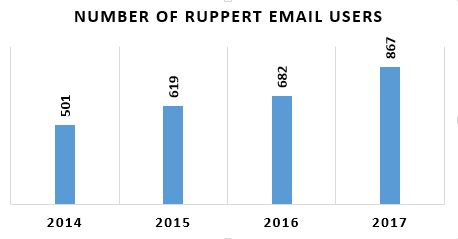By Dan Spruill, Director of IT
 While most of you know that we store recently sent and received emails in your Outlook email account, you may not know that we move emails older than three months into an archive on our server. As we continue to grow, both in number of employees and our use of electronic systems, our data storage needs also grow. Therefore, we will be revising our email retention plan in the near future as part of a larger document policy review, with the goal of finding a more efficient way to choose which data is archived and for how long.
While most of you know that we store recently sent and received emails in your Outlook email account, you may not know that we move emails older than three months into an archive on our server. As we continue to grow, both in number of employees and our use of electronic systems, our data storage needs also grow. Therefore, we will be revising our email retention plan in the near future as part of a larger document policy review, with the goal of finding a more efficient way to choose which data is archived and for how long.
Just last year, we added to our digital footprint significantly with the addition of electronic property service reports (PSR’s) in the maintenance division. The PSR’s are created using our Ruppert Mobile App, then saved to our server, and then emailed to multiple recipients including customers and our own employees. In effect, this has us storing five or six copies of the same file in our systems, greatly increasing the amount of data being stored on a daily basis.

At the moment, we are storing five terabytes (TB) of email data in our archive and 1.5 TB of data (those emails we have received and sent within the last three months) in Outlook. This means that three months from now, when those older emails get archived, we could have a 30% increase in our email storage requirements. This amount will likely decrease somewhat, as we can and should be deleting junk email and conversations we no longer need on a regular basis. So although not all of this current data will be converted to our archive, it will still represent a significant increase in our storage needs.
In addition to data storage needs, there are many things to consider in reviewing our own retention policy, including legal requirements for our different departments (like accounting and human resources) as well as job lifecycles in the landscape division and multi-year contracts in the maintenance division, just to name a few. The IRS minimum retention time of seven years is generally the safest metric to follow, however not all of our data falls into this category. During our revision, we will look to create smaller groupings to achieve the right balance between length of retention time and the amount of data we store, with a focus on keeping only those items that we need—eliminating spam, junk, and deleted emails will be part of the revised policy.
Until the revised is policy in place, we ask that each of you do your part to keep our data storage needs to a minimum by keeping your email inbox cleaned up. Remember to regularly go through your inbox and sent folders to delete emails that are no longer needed. We thank you in advance for helping us make the most out of our data storage investments.